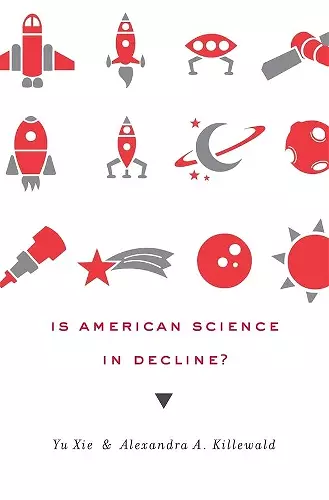Is American Science in Decline?
Yu Xie author Alexandra A Killewald author
Format:Hardback
Publisher:Harvard University Press
Published:11th Jul '12
Should be back in stock very soon

A compelling book that rigorously answers all the parts of a deceptively simple question. -- Michael Hout, University of California, Berkeley Opinion about the state of American science ranges from alarmist concerns that the enterprise is in imminent decline to the observation that there are many well-trained scientists with weak career prospects. Xie and Killewald bring a vast array of empirical evidence to bear on the issues. Their clear and concise analysis-and sometimes surprising findings-illuminate the strengths and weaknesses of the American scientific enterprise and, fortunately, lead to a nuanced, but essentially positive diagnosis of its health and prospects. -- Robert M. Hauser, University of Wisconsin-Madison
While the authors identify areas of concern regarding scientists’ low earnings, competition from Asia, and the declining number of academic positions, they conclude that science in the United States is not in decline. American culture is highly conducive to science, and educated workers with a range of skills will still be in demand in the future.
Alarmists argue that the United States urgently needs more and better-trained scientists to compete with the rest of the world. Their critics counter that, far from facing a shortage, we are producing a glut of young scientists with poor employment prospects. Both camps have issued reports in recent years that predict the looming decline of American science. Drawing on their extensive analysis of national data sets, Yu Xie and Alexandra Killewald have welcome news to share: American science is in good health.
Is American Science in Decline? does reveal areas of concern, namely scientists’ low earnings, the increasing competition they face from Asia, and the declining number of doctorates who secure academic positions. But the authors argue that the values inherent in American culture make the country highly conducive to science for the foreseeable future. They do not see globalization as a threat but rather a potential benefit, since it promotes efficiency in science through knowledge-sharing. In an age when other countries are catching up, American science will inevitably become less dominant, even though it is not in decline relative to its own past. As technology continues to change the American economy, better-educated workers with a range of skills will be in demand. So as a matter of policy, the authors urge that science education not be detached from general education.
A compelling book that rigorously answers all the parts of a deceptively simple question. -- Michael Hout, University of California, Berkeley
Opinion about the state of American science ranges from alarmist concerns that the enterprise is in imminent decline to the observation that there are many well-trained scientists with weak career prospects. Xie and Killewald bring a vast array of empirical evidence to bear on the issues. Their clear and concise analysis—and sometimes surprising findings—illuminate the strengths and weaknesses of the American scientific enterprise and, fortunately, lead to a nuanced, but essentially positive diagnosis of its health and prospects. -- Robert M. Hauser, University of Wisconsin–Madison
In the heated debate over the state of U.S. science, alarmists say there are too few young high-flyers; others, too many. Enter sociologists Yu Xie and Alexandra Killewald, whose nuanced view is backed up by able number-crunching. The United States, they found, is still a scientific superpower: the workforce has grown, and numbers of new graduates at all levels of higher education are rising. But the future is less certain: the number of US doctorate holders taking up academic posts is in decline and earnings are stagnant, for instance. * Nature *
Xie and Killewald take a forensic look at who does science in the U.S. today, where they work and why. Their approach is thorough and systematic, and draws together a variety of available data, as well as offering some fresh analysis. This is a short book...It is also a useful one, providing a welcome corrective to the wailing and gnashing of teeth that too often accompanies this debate. -- James Wilsdon * Times Higher Education *
ISBN: 9780674052420
Dimensions: unknown
Weight: unknown
240 pages